Sacrifice of the Indian Army who voluntarily surrendered to death to save the lives of Hindu-Sikh people from Muslim invaders due to lack of assistance from the Jawaharlal Nehru-led government and Nehru's wrong policies during the Indo-Pak war of 1947 A collection of unheard stories of Lt. Gen. K.K. Presented on the basis of Nanda's book “In the shadow of constant war”, which every Indian should read so that by reading the saga of those martyrs who disappeared from the pages of history of India, you can pray to God for the peace of their soul.
Background of Indo-Pakistani War
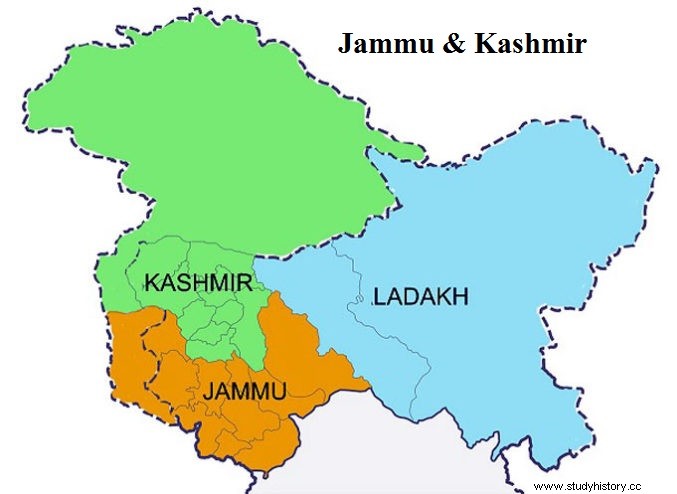
By 15 August 1947, except the princely states of Junagadh, Hyderabad and Jammu and Kashmir, all the princely states of India had joined the newly divided India's Dominion Pakistan or India. Being 78% Muslim population, Muhammad Ali Jinnah was asserting his natural right over Kashmir, while Maharaja Harisingh of Jammu and Kashmir had lost his life due to the horrific massacre of Hindus-Buddhists-Sikhs in Pakistan and their women being raped and stripped. Hindu-Buddhist-Sikh were not ready to join Pakistan for the protection of the subjects.
His apprehensions in joining India were also not less because Jawaharlal Nehru was scolding Maharaj because of Sheikh Abdullah, was involved in the British League conspiracy going on since 1945 to hand over Mountbatten Kashmir to Pakistan, then Gandhi on 1 August. They had gone to Kashmir and announced that Jammu and Kashmir will be found in India or in Pakistan this decision will be decided by the people here after independence on the basis of plebiscite. In Jammu and Kashmir with 78% Muslim population, the plebiscite decision was not expected to go in India's favour. Therefore they were worried about the future of their Hindu-Buddhist-Sikh subjects and were unable to take the decision of merger.
Muhammad Ali Jinnah was pressurizing the Maharaja to include Jammu and Kashmir in Pakistan at any cost. Not receiving the expected response from Maharaja Harisingh, Pakistan invaded Kashmir on 22 October 1947 by advancing the Jigrewale tribes. It is not clear till today that the British military officer based in Pakistan did not give information about such a big incident to his counterpart British military officer based in India or the British military officer of India did not inform the Indian Defense Ministry.
Muslim soldiers of Jammu and Kashmir revolt
Maharaja Hari Singh of Jammu and Kashmir organized his army on the basis of 50-50 Muslim-non-Muslim army. Before the invasion, communal stir was created in the frontier areas in October and the Muslim population there revolted against the Maharaja due to the help and encouragement of Pakistan, then Pakistan attacked.
The Maharaja's army had just entered the field to take on the invaders fiercely, that the Muslim soldiers of Jammu and Kashmir under the leadership of their own Muslim commander started meeting with the invaders one by one against Maharaj Harisingh, which broke the back of the army of Jammu and Kashmir. and she was forced to retreat rapidly. The horrific massacre, rape, loot and kidnapping of Hindus, Sikhs, Buddhists of Jammu and Kashmir by Muslim invaders and rebel Kashmiri soldiers started.
In such an odd situation, Maharaja Hari Singh of Jammu and Kashmir sought help from the Government of India, but the Government of India under Jawaharlal Nehru put two conditions that the Maharaja should first accept the accession of Jammu and Kashmir to India and kill the supporters of India and create terror in the valley. Release the jailed criminal Sheikh Abdullah for spreading violence and make him the Prime Minister of Jammu and Kashmir.
On 22 October 1947, Lieutenant Colonel Narayan Singh informed the Srinagar Headquarters that the army of Kashmir was proving completely incapable of dealing with this invasion due to the Muslim soldiers of the Dogra battalion mingling with the insurgents and that the two were easily caught by the Muslim invaders. I have arrived. After that he was brutally murdered by his own Muslim soldiers.
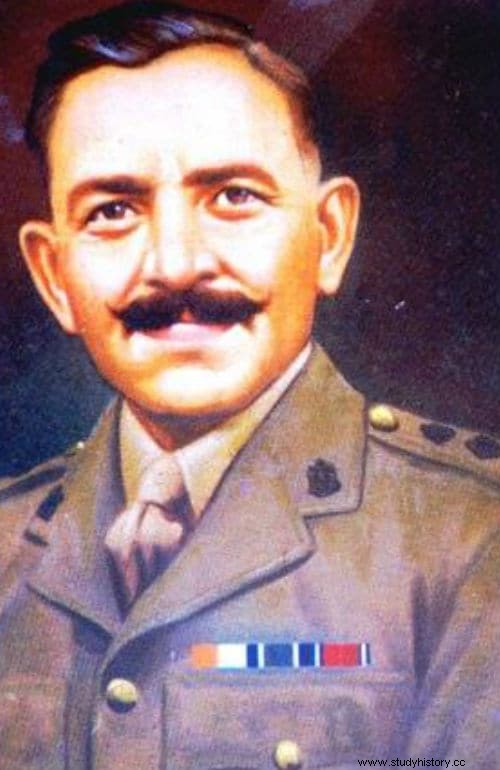
Maharaj Harisingh sent Brigadier Rajendra Singh with an army to stop the massacre of Hindus and Sikhs in Muzaffarabad. Brigadier Rajendra Singh and his brave soldiers at Uri, despite the weak position and lack of ammunition, held the invaders from 24-25 October with the hope that soon they would get military assistance from the Indian government and retreated towards Baramulla but Baramulla Shortly before this, these brave soldiers were martyred while fighting bravely.
merger of Jammu and Kashmir with India
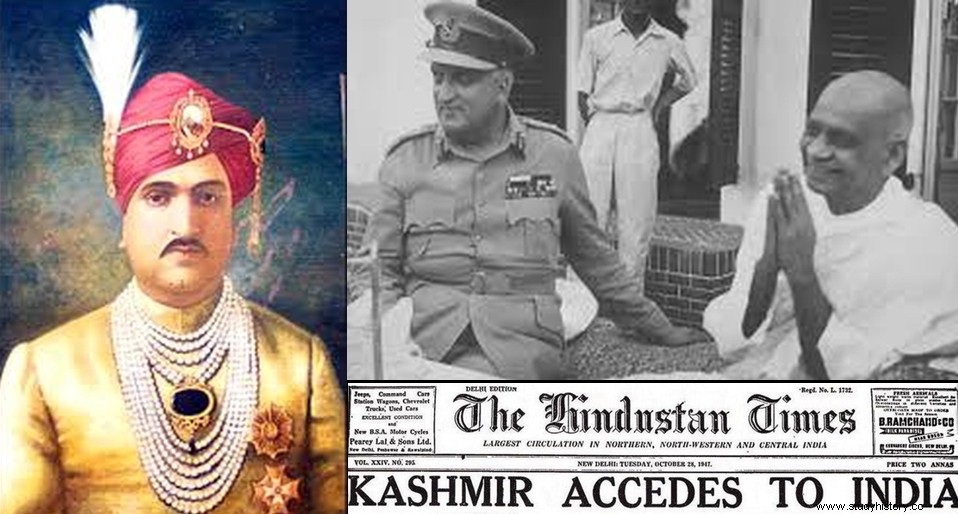
After that, to protect the life and property of his Hindu-Sikh-Buddhist subjects, Maharaj Harisingh signed the Instrument of Accession of Jammu and Kashmir to India on October 27, 1947 and released Sheikh Abdullah and appointed him as the Prime Minister of Jammu and Kashmir. done. After that, under the pressure of Sardar Patel, the Nehru government sent military aid against the Pakistani invaders on the same day.
On 27 October, Lt Col DR Rai took the front with his battalion at Baramulla. He was martyred after being shot while saving Srinagar from the invaders. His valor and valor were praised in Parliament and he was awarded the Maha Vir Chakra.
Baramulla
Muslim invaders entered the prosperous city of Baramulla on 26 October, looting and raping. Hindus and Sikhs were murdered and their houses were looted and burnt. Young women were kidnapped to sell in the streets of Peshawar and Rawalpindi. Maqbool Sherwani, a Muslim who called Hindus and Sikhs his brother, was murdered in a public square. Colonel Dykes, an Englishman who ran the missionary hospital in Baramulla, and his assistants were also shot dead.
The residents of this place, Hindus, Sikhs, Muslims, all left their property and fled towards the mountains. The invaders were happy with their good fortune after getting many girls and money. The jihad of some Pathans remained entangled in the enjoyment of the beautiful girls of Baramulla and their own greed. They stayed there for a few days and then returned home after looting the money and the girls.
Gilgit
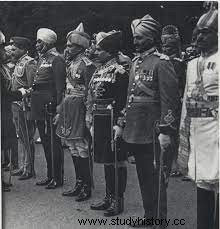
Before 15 August 1947, Gilgit was under the British Government under an agreement with Maharaj. After 15th August it came back under the control of Maharaj. The Maharaja appointed Brigadier Gunsara Singh as the governor and sent him to Gilgit. Brigadier Gunsara Singh reached there and saw that the Gilgit Scouts had already taken over the administration under the command of Major Brown. Gilgit Scouts with 100 percent Muslim soldiers revolted in favor of Pakistan and on 1 November Brigadier Gunsara Singh was warned to lay down arms, otherwise all Hindu Sikhs of Gilgit would be killed.

Brigadier Gunsara Singh and his Hindu Sikh soldiers, who came to fight the Pakistani invaders, were surrounded by Muslim soldiers from their own state. Initially, the brigadier resisted, but eventually surrendered along with the soldiers to stop the continued brutal killing and rape of Hindu-Sikh people by Muslims, in the hope that they would no longer murder and rape Hindu-Sikh people.
But this did not happen, the soldiers who surrendered themselves to protect the Hindu Sikh people were taken prisoner and then all the Sikhs and soldiers were killed. Those who initially managed to escape were also captured and killed one by one. Since then Gilgit is under the control of Pakistan.
Skardu
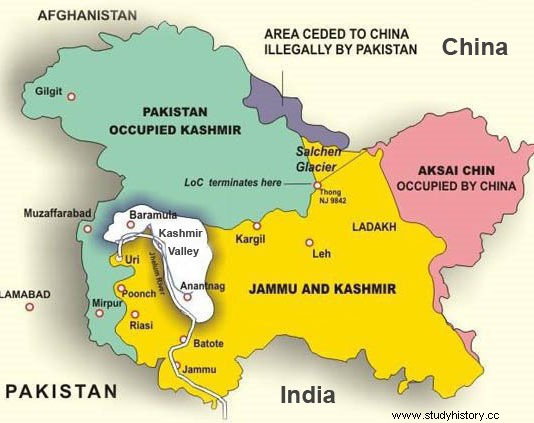
During the Gilgit rebellion, 100 Muslim soldiers of the Jammu and Kashmir Army under the leadership of Captain Nek Alam had captured Skardu. Major Sherjung Thapa arrived there with 100 soldiers on 3 November to protect Skardu. On the night of 9-10 February, about 600 Muslim invaders attacked two border posts. Then here also Captain Nek Alam along with his soldiers met the invaders and assisted the Muslim invaders in destroying the second post. In this odd situation, only two units of 70-70 soldiers could come to the aid. Since then, Major Thapa continued to fight the invaders with indomitable courage.
When General Thimayya instructed the army to withdraw in May 1948, Thapa pleaded that he could not leave behind thousands of refugees to be killed by the invaders. So he should be allowed to stay there.
On June 17, the invaders sent a messenger to Skardu for a ceasefire. It was said in the message that if the guard army surrenders, then it will be treated well. Thapa declined the offer. On the evening of 12 August, the invaders first opened fire and then launched a vigorous attack. Thapa's soldiers fought bravely and pushed them back. This siege lasted for six months and three days. Despite repeated requests for help, no assistance was sent from the Nehru government.
When all the ammunition was exhausted, Major Thapa secretly asked his men to leave the fort in small groups and reach the main base. Swayam stayed there with a JCO and 35 soldiers. Finally, seeing no other solution, he surrendered on August 14, 1948. Thapa was taken prisoner, but all the soldiers and refugees were brutally murdered. Women were kept alive for worse.
Other historical sources suggest that Skardu was in possession of about 40,000 Hindu-Sikh invaders. After the surrender of the Indian Army, on August 14, 1948, an order came from Pakistan that all Hindu-Sikh men should be slaughtered under Sharia law and their women should be divided into soldiers under Sharia law.
Draksha and Kargil
These invaders went ahead and occupied Kargil and Draksha. In Draksha, the Indian Guard Army stood for four weeks without any hope of relief, but due to no help (from the Nehru government), most of them were eventually killed by the invaders.
Jammu
In the third week of October, the invaders wreaked havoc west of the Jammu-Jhangar road with slogans of burn, kill, abduct and destroy. There were raids in many more border villages of Kashmir; But in the beginning he was engaged only in plundering, stealing cattle and kidnapping women. Nevertheless, they were successful in grabbing a considerable area of the state and laying siege to the state's defense forces at Rajouri, Jhangar, Nowshera, Mirpur and Bhimber. The Hindu Sikhs of these villages, who were successful in saving lives and dignity, became refugees under the protection of the guard army.
Nehru government's betrayal of army?
The responsibility of protecting the communication system was on the 268 Infantry Brigade. Brigadier Paranjpe gathered momentum and captured Beripatta on 16 November and Nowshera on 18. He also won Jhangar on 19 November and captured Kotli on 26 November. But it is not known why he was transferred in the middle of his conquest, due to which not only the campaign slowed down, but despite the extent of bravery and damage to the invaders, Jhangar again went into the hands of the invaders to get it back. A long battle had to be fought again and it was recovered months later on 17 March 1948.
Rajouri
Bhimber was handed over to the invaders on 28 October, Mendhar on 3 November and Bagh also on 10 November 1947. Then the invaders attacked Rajouri and killed 30000 (official data) Hindu-Sikhs and their women were kidnapped or raped.
The invaders who failed to get Jhangar started terrible atrocities in Rajouri and its surrounding areas. While traveling towards Rajouri, the Indian army reached Chingus and found it engulfed in flames. The fleeing enemy was following the Sarvakshar policy i.e. loot if possible, destroy everything else and destroy it. As a result of the atrocities of the enemy, bodies were found in huge pits in Rajouri. It was clear that the invaders had committed a horrific massacre before leaving the city.
One journalist wrote, “Dead bodies of humans and animals are seen surrounded by dogs and vultures. The city is half-burnt and there is an eerie silence; Because the people who survived the massacre have fled towards the mountains. Rajouri is a city of the dying and the dead."
Budgam
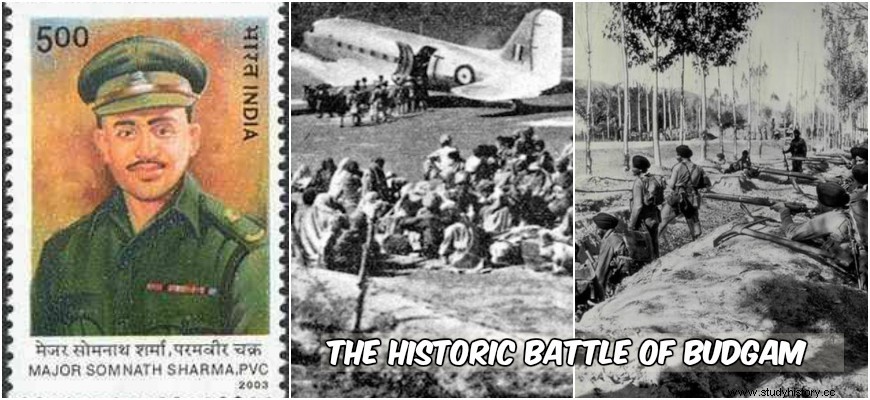
Since the medium of arrival of the army and Rashad from India was the air plane, the Kumaon battalion was deployed under the leadership of Major Somnath Sharma to protect the Budgam airfield. Soon they were attacked by cannons from the west. The attackers overpowered Major Sharma's company. उनको अग्रिम पलटन का स्थान तो छोडना पड़ा, परन्तु, तीसरी पलटन के साथ वे अंत तक डटे रहे. वायरलेस पर सेना मुख्यालय को उनका अंतिम संदेश था-“शत्रु हमसे केवल ५० गज की दुरी पर है. हम संख्या में उनसे बहुत कम हैं. मैं एक इंच भी पीछे नहीं हटूंगा और जबतक एक भी सैनिक है, मैं लड़ता रहूँगा.”
शीघ्र ही शत्रु की तोप के गोले ने उनके जीवन का अंत कर दिया, परन्तु तबतक वे बहुत कम सहयोगियों और संसाधनों से ही शत्रु को भारी क्षति पहुँचाने और उसके सैनिकों को हताहत करने में सफल रहे थे. (नेहरु सरकार ने इन्हें सैन्य सहायता तो नहीं भेजी पर) भारत सरकार ने इन्हें मरणोपरांत परमवीरचक्र से सम्मानित किया.
नेहरु सरकार का सेना के साथ एक और विश्वासघात?
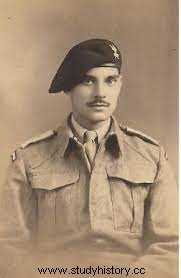
इधर ब्रिगेडियर सेन ने शालातैंग की लड़ाई में ५०० पाकिस्तानी सैनिकों को मारकर बुरी तरह पराजित किया और श्रीनगर बचा लिया. फिर वे ८ नवम्बर को बारामुला पहुंचे. आक्रमणकारी हताश होकर भाग रहे थे. १३ नवम्बर को उन्होंने उड़ी पर भी विजय प्राप्त कर ली. इस बिंदु पर आकर ब्रिगेड के कमांडर ने और सेना की मांग की ताकि इसका लाभ उठाते हुए आगे बढ़ें और मुजफ्फराबाद तथा दोमेल को भी अधिकार में कर ले.
सेना के कमांडर जनरल रसेल का भी यही मत था, परन्तु नेहरु सरकार ने इसकी अनुमति नहीं दी. यह एक भारी भूल थी. आक्रमणकारियों को कश्मीर घाटी से भगाकर घाटी को उनसे मुक्त करने का सुनहला अवसर हाथ से चला गया. इतना ही नहीं जनरल कुलवंत सिंह ने पता नहीं क्यों एक बटालियन और वापस बुला लिया, जबकि वहाँ सफलता पक्की करने के लिए और सेना की आवश्यकता थी.
ब्रिगेडियर सेन का यह अनुमान सही था कि वे उड़ी की रक्षा व्यवस्था तथा संचार मार्ग में गडबडी फैलायेंगे और कमजोर सुरक्षा वाले स्थानों पर अधिकार पाने का प्रयास करेंगे परन्तु उनकी आशंकाओं को नेहरु सरकार में काल्पनिक माना गया. इसका परिणाम घातक हुआ. आक्रमणकारियों ने तैयारी कर घात लगाकर हमला किया. ब्रिगेडियर सेन को भारी जान माल के नुकसान के साथ पीछे हटना पड़ा. उड़ी तो किसी प्रकार सुरक्षित हो गया परन्तु पुंछ को मुक्त कराने में विफल रहे. इसका घातक प्रभाव सेना के मनोबल पर भी पड़ा. १६१ इन्फेंट्री ब्रिगेड बहुत घबरा गयी थी. आक्रामक ब्रिगेडियर सेन की सेना डिफेंसिव और प्रभावहीन होने को बाध्य हो गयी.
गुरुदत्त
गुरुदत्त ने १९४७ के भारत-पाकिस्तान युद्ध पर लिखी अपनी पुस्तक “युद्ध और शांति” में नेहरु की इसी अक्षम्य भूल जिसके कारण जीतने के करीब पहुंचकर भी कश्मीर का एक बड़ा हिस्सा पाकिस्तान के हवाले करना पड़ा पर कटाक्ष करते हुए लिखा था की जिन राजनीतिज्ञों को युद्धनीति का क ख ग भी पता नहीं हो वे सैनिकों को डिक्टेट कर राष्ट्र की सुरक्षा पर कुठाराघात करते हैं. सैनिकों को किस प्रकार लड़ना है कैसे लड़ना है उन्हें स्वतन्त्रतापूर्वक तय करने दे.
नेहरु सरकार का देश के साथ सबसे बड़ा विश्वासघात
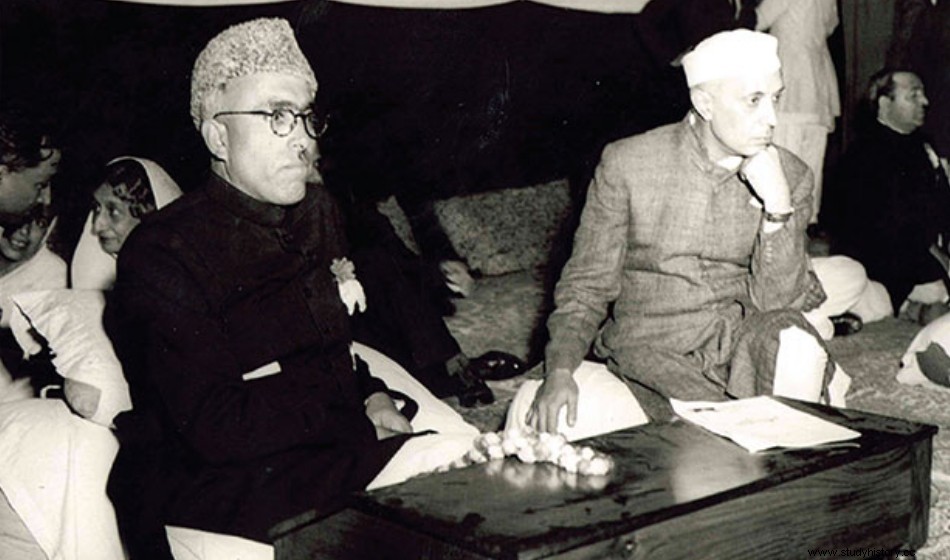
ग्रीष्म ऋतू आरम्भ होते ही भारतीय सेना ने कार्यवाही तेज करते हुए गुरेज, कंजलवान पर अधिकार कर लिया. कर्नल राजेंद्र सिंह के नेतृत्व में नवम्बर में द्राक्ष पर भी अधिकार कर लिया गया. नवम्बर में ही गोरखा रेजिमेंट ने कारगिल भी कब्जे में ले लिया. इस पराजय के बाद आक्रमणकारी पीछे हटने लगे. १२ अप्रैल १९४८ को १९ इन्फेंट्री ब्रिगेड ने राम राघव राने के नेतृत्व में राजौरी वापस ले लिया. एक साल की घेराबंदी के बाद पुंछ पर कब्जा करने में सफल हो गये. भारतीय सेना गिलगित में गिलगित स्काउट और पाकिस्तानी सेना को हराकर आगे बढ़ गयी और मुजफ्फराबाद, मीरपुर और स्कार्दू पर कब्जा करने के करीब थी कि….
भारतीय सेना अपने शौर्य और पराक्रम से पाक अधिकृत कश्मीर के अधिकांश क्षेत्रों पर कब्जा कर चुकी थी और तेजी से आगे बढ़ रही थी, परन्तु नेहरु ने अचानक युद्ध विराम की घोषणा कर दी. हद तो तब हुई जब युद्ध विराम पश्चात पिछली तारीख से यथास्थिति बहाली की घोषणा कर जानबूझकर विजित भारतीय क्षेत्र को पाकिस्तान के हवाले कर दिया गया.

इतना ही नहीं, नेहरु ने यूएनओ में जाकर चैप्टर सात जिसमे एक आक्रमणकारी देश द्वारा अपने सीमा पर दखल से सम्बन्धित शिकायत की व्यवस्था है कि जगह चैप्टर छः के तहत शिकायत दर्ज कराई जिसमें विवादित क्षेत्र की समस्या के समाधान की व्यवस्था है. नेहरु के इस गलती के कारण ही पाकिस्तान को अब कश्मीर पर हक जताने का अनर्थकारी अनावश्यक हक प्राप्त हो गया है. इस प्रकार उन्होंने सेना के सम्पूर्ण शौर्य और बलिदान पर पानी फेर दिया जिसके कारण भारतीय सेना कश्मीर में आजतक पाकिस्तान से रोज अप्रत्यक्ष युद्ध लड़ने को बाध्य है.
